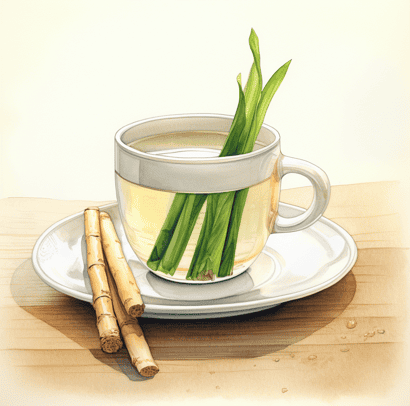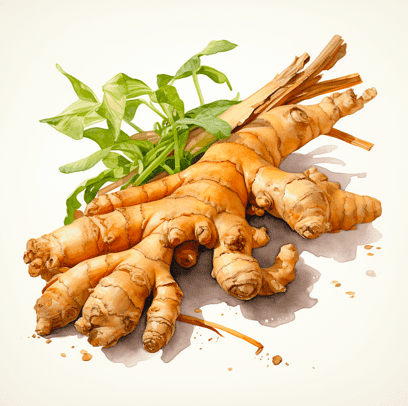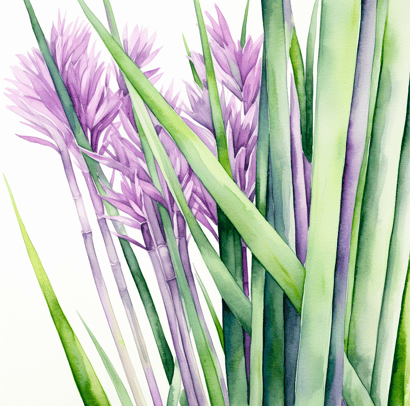
Often, the simplest ingredients in our kitchen, like zesty lemongrass and fresh ginger root, hold the key to revitalising our health and appearance. Find the best Lemongrass ginger tea recipe for you below.
Hi, I’m Hazel
I gave up on skincare after years of issues with acne and sensitive skin.
But after going plant-based, my skin cleared up and even started to glow. Now I help women reveal their natural beauty with simple, delicious plant-based food.
I also used to be a nurse, and love nerding out on nutritional science (high-quality science, that is).

As usual, this post is based on the strongest nutritional evidence I could find with a focus on the simplest, most delicious foods
…because who has time to waste on actions that don’t work?
The quick version:
Discover the delightful and healthful world of Lemongrass Ginger Tea with these 5 simple yet diverse recipes.
From the classic hot brew to invigorating green tea blends and refreshing iced variations, each recipe harnesses the potent benefits of lemongrass and ginger, boosting your wellness and beauty regimen.
Brewing the Perfect Cup
The following recipes serve 2 people.
The Classic Lemongrass Ginger Tea

Ingredients
- 1 stalk of fresh lemongrass, chopped into 2-inch pieces
- 1/2 inch of fresh ginger root, thinly sliced
- 2 cups of water
- Honey or agave syrup, to taste (optional)
Instructions
- Boil 2 cups of water in a small saucepan.
- Add the chopped lemongrass and sliced ginger to the boiling water.
- Reduce the heat to a low simmer and steep for 15-20 minutes.
- Strain the tea into cups and sweeten as desired.
Lemongrass Ginger Tea with Mint
Ingredients
- 1 stalk of fresh lemongrass, chopped
- 1/2 inch of fresh ginger root, sliced
- A few fresh mint leaves
- 2 cups of water
- Lemon slices for garnish (optional)
Instructions
- Add lemongrass, ginger, and mint to cold water in a pot.
- Bring to a boil, then turn off the heat.
- Allow the mixture to steep as it cools to room temperature.
- Strain and serve with ice and lemon slices for a refreshing iced lemongrass tea.
Spicy Lemongrass Ginger Tea

Ingredients
- 1 stalk of fresh lemongrass, finely chopped
- 1/2 inch of fresh ginger root, grated (or more, to taste)
- 1/2 small cinnamon stick
- 1/2 teaspoon of black peppercorns
- 2 cups of cold water
- Honey or maple syrup to taste (optional)
Instructions
- Combine all ingredients in a pot and bring to a boil.
- Reduce to a simmer for 20 minutes.
- Strain and serve hot, sweetened with honey if desired.
Lemongrass Ginger Green Tea
Ingredients
- 1 stalk of fresh lemongrass, finely chopped
- 1/2 inch of fresh ginger root, grated
- 1 green tea bag or equivalent loose green tea leaves
- 2 cups of boiling water
- Honey or agave syrup, to taste (optional)
Instructions
- Boil 2 cups of water in a small saucepan.
- Add the chopped lemongrass and grated ginger.
- Simmer for 10 minutes, then add the green tea bag or leaves.
- Steep for an additional 3 minutes.
- Strain the tea into cups and sweeten as desired.
- Serve hot, enjoying the antioxidant benefits of the green tea combined with the refreshing zest of lemongrass and the warmth of ginger.
Iced Lemongrass Ginger Tea

Ingredients
- 1 stalk of fresh lemongrass, finely chopped
- 1/2 inch of fresh ginger root, grated
- 2 cups of cold water
- Ice cubes
- Lemon or lime slices for garnish
- Honey or agave syrup, to taste (optional)
Instructions
- Add the lemongrass and ginger to cold water in a pot and bring to a boil.
- Simmer for 15-20 minutes to extract the flavours fully.
- Let the tea cool to room temperature.
- Strain the tea into a pitcher.
- Stir in honey or agave syrup if using, mixing well to dissolve.
- Fill glasses with ice and pour the tea over the ice.
- Squeeze in a little lemon juice or lime juice for an extra refreshing touch.
- Serve immediately during hot summer days.
Lemongrass and Ginger: A Match Made in Heaven
The combination of lemongrass and ginger isn’t just beneficial; it’s a delightful sensory experience.

Fresh lemongrass tea emits a citrusy aroma that can brighten your day, while the spicy kick of ginger warms you from the inside out.
Whether you’re using fresh lemongrass stalks or dried lemongrass, the result is a lemongrass drink that not only tastes great but also contributes to your health in multiple ways.
What is Lemongrass and Ginger Tea Good For?
Drinking Lemongrass ginger tea not only offers a moment of calm but also gifts a range of health benefits.
The antioxidants from both ingredients may enhance skin clarity (1, 2). Ginger in particular is anti-inflammatory (3).
Regular consumption can aid in weight loss, thanks to its metabolism-boosting properties.
As a herbal tea, lemongrass and ginger provides caffeine-free energy, making it a great substitute for your morning coffee.
The ginger blend in the tea is excellent for soothing sore throats and improving digestion.
With all of these benefits, adding a ginger lemongrass tea recipe into your tea routine is a great way to enhance your overall health and beauty.
Is it OK to Drink Lemongrass and Ginger Tea Everyday?
Yes, drinking lemongrass ginger tea every day is generally considered safe and can be beneficial for your health.
This tea combines the digestive and calming benefits of lemongrass with the anti-inflammatory and antioxidant properties of ginger.
However, if you have certain health conditions or are pregnant, it’s a good idea to consult with a healthcare provider to ensure it’s appropriate for your specific health needs. Moderation is key, as with any herbal supplement.
Creative Uses for Leftovers
The versatility of lemongrass ginger tea extends beyond a simple beverage.
Consider using leftover tea as a delicious base for various Thai recipes like fresh vegetable soup or curry, enhancing dishes with its subtle, zesty flavours.
It’s also perfect for creating herbal drink mixtures, adding a unique twist to homemade cocktails or mocktails.
For a culinary experiment, use the cooled tea to poach fruits or as a marinade for vegetables, infusing them with its citrusy brightness and spicy notes.
These options help you to both elevate the flavours of your dishes and keep enhancing the health and beauty value of your diet.
Conclusion
Ready to embrace the delightful flavours and health benefits of Lemongrass ginger tea? This simple yet powerful lemongrass and ginger tea recipe offers more than just a refreshing drink; it’s a step towards a healthier, more vibrant lifestyle. Whether served hot or iced, as part of your morning routine, or as a calming evening ritual, this tea is easy to make and even easier to love.
References
Most references below will link to the original peer-reviewed study itself. However, sometimes I will link to a video over at NutritionFacts.org instead, which is by far the single best resource of brutally transparent nutritional evidence you will ever see. Dr Greger tells a great story about the realities of the science and if I think you will benefit more from one of his videos, the link will take you there instead.
Happy nerding!
- Whitehead RD, Re D, Xiao D, Ozakinci G, Perrett DI. You are what you eat: within-subject increases in fruit and vegetable consumption confer beneficial skin-color changes. PLoS One. 2012;7(3):e32988. doi:10.1371/journal.pone.0032988
- Carlsen MH, Halvorsen BL, Holte K, et al. The total antioxidant content of more than 3100 foods, beverages, spices, herbs and supplements used worldwide. Nutr J. 2010;9:3. Published 2010 Jan 22. doi:10.1186/1475-2891-9-3
- Shivappa N, Steck SE, Hurley TG, Hussey JR, Hébert JR. Designing and developing a literature-derived, population-based dietary inflammatory index. Public Health Nutr. 2014;17(8):1689-1696. doi:10.1017/S1368980013002115